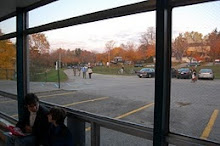According to the Wisconsin Realtor's Association, the median sale price for existing homes in Wisconsin rose 2.4% from Q3 2006 to Q3 2007. This is surprising because
a) Real estate prices compared to rent prices are far above historical norms.
b) The subprime meltdown (March 2007) and mortgage liquidity trouble (Aug 2007) happened during that period.
I cannot explain why the bubble persists in Wisconsin, at least for existing homes, now that the easy money has been shut off. It is clear, though, that a lot of people have an interest in seeing the bubble continue or at least deflate as slow as possible.
Look at the implicit assumptions in a recent WI State Journal article on the topic: (emphasis added)
Stephen Malpezzi, real estate department chairman at the UW-Madison School of Business, said he expects most Wisconsin cities to fare better than areas with shaky economies.
[snip]
"I don't see any steep (price) declines or huge problems," he said. Wisconsin home sales were better than the nation.
[snip]
So far Wisconsin has weathered the foreclosure and subprime mortgage crises better than more speculative housing markets.
A lot of things are going "better" for Wisconsin. But what is "better"? The article doesn't make it clear. It seems that part of "better" is a) people spending more money on housing and b) people moving more frequently instead of staying in one place. If inflation-adjusted home prices and rate of sales went back to their year 2000 levels, these people would call it an absolute crisis. But somehow life went on in the year 2000. On the other hand, the "best" situation would be for everyone to be spending over 50% of their income on housing and to move every year.
This is all about what's best for the FIRE industries (Finance, Insurance, and Real Estate). What does it mean for other people? We are working similar jobs to what our parents did 30 years ago and living in similar houses. The difference is if we buy a house we need to liquidate more of our other investments and/or borrow more money than they did. Because of all that money being borrowed, though, money market funds that invest in mortgage-backed securities provide good returns, safety, and liquidity. People borrow a lot more money to buy a house, pay more to insure it, and receive more money when they sell it. There is definitely a lot more money sloshing around through the banking system, but unless you work in one of the FIRE industries, you're none the better for it.
Because the bubble was so beneficial to the FIRE industries, they will hold on to it as long as they can. They infect the language so that news paper articles unapologetically write as if the more money people have tied up in houses the better. They are not powerful enough, however, to stop the forces of supply and demand. If year after year there are no investment properties that generate enough income to cash flow, investors will not be there to buy the properties. If the families are making more interest on the amount of money required to buy a house than they pay on rent, they will not forgo that interest to own property. In short, real estate prices and rent prices will return to parity.
It is not my intention to condemn the FIRE industries. I condemn newspaper articles that imply that what's good for the FIRE industries is good everyone else.
Subscribe to:
Post Comments (Atom)


No comments:
Post a Comment